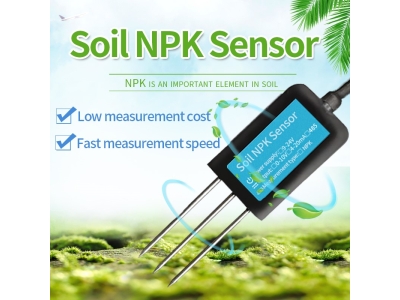Agriculture is an industry that heavily relies on the understanding and management of soil conditions. Farmers need to know the moisture content, temperature, nutrient levels, and other factors in their soil in order to optimize crop growth and yield. Traditionally, this information has been obtained through manual sampling and testing, which can be time-consuming and labor-intensive. However, with the advancement of technology, soil sensors are emerging as a game-changer in the field of agriculture.

One of the key ways soil sensors will change agriculture is by providing real-time and continuous monitoring of soil conditions. These sensors can be placed directly in the soil, allowing farmers to receive immediate feedback on important parameters such as moisture levels. Real-time monitoring enables farmers to make data-driven decisions and take quick action when necessary. For example, if the sensor indicates that the soil is too dry, farmers can promptly initiate irrigation. This not only saves time but also ensures that crops are receiving the optimal amount of water, reducing waste and improving water-use efficiency.
Another way soil sensors will change agriculture is by enabling precision agriculture techniques. Precision agriculture aims to optimize crop production by tailoring management practices to specific areas within a field. Soil sensors play a crucial role in this approach by providing accurate and detailed information about the variability of soil conditions across a field. This information can be used to create soil maps, which identify zones with different soil characteristics. By understanding these variations, farmers can apply inputs such as water, fertilizer, and pesticides more efficiently, reducing costs and minimizing environmental impact.
Furthermore, soil sensors will revolutionize agriculture by enabling remote monitoring and control. With the help of digital connectivity and Internet of Things (IoT) technology, soil sensors can transmit data wirelessly to a central control system. This allows farmers to monitor soil conditions remotely, without the need to physically visit each field. Additionally, farmers can set up automated systems that adjust irrigation or nutrient application based on real-time sensor data. Remote monitoring and control increase operational efficiency and save labor, allowing farmers to manage larger areas of land more effectively.
Soil sensors also have the potential to improve sustainability and environmental stewardship in agriculture. By providing accurate measurements of soil moisture, these sensors can help farmers optimize irrigation practices, reduce water usage, and prevent overwatering. This not only conserves a valuable resource but also prevents waterlogging and nutrient leaching, which can harm crop health and contribute to pollution. Additionally, by monitoring nutrient levels in the soil, farmers can apply fertilizers precisely and avoid excessive use, reducing the risk of nutrient runoff into water bodies.
Moreover, soil sensors can contribute to soil health management. Soil health is crucial for sustainable agriculture, as it affects crop growth, nutrient availability, and resilience to pests and diseases. By monitoring factors such as pH, organic matter content, and compaction, soil sensors can provide insights into the overall health of the soil. This information enables farmers to take proactive measures to improve soil quality, such as adjusting pH, implementing organic soil amendments, or practicing conservation tillage techniques.
In conclusion, soil sensors have the potential to revolutionize agriculture by providing real-time and continuous monitoring of soil conditions. They enable precision agriculture techniques, remote monitoring and control, and contribute to sustainability and soil health management. With the help of soil sensors, farmers can make data-driven decisions, optimize resource use, reduce costs, and minimize environmental impact. As technology continues to advance, soil sensors will undoubtedly play a crucial role in shaping the future of agriculture.





